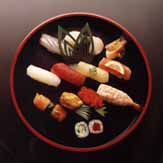
Home
About Sushi
Sushi Etiquette
Guestbook
18242 Imperial Hwy
Yorba Linda, CA 92886
(714) 524-9003
Email: Kaz@Kaz-Maguroya.com

Sushi Etiquette
The Setting
Regardless of the city or even the country, some things about sushi
restaurants and bars do not change. Assuming that you are lucky
enough not to have to wait, once you arrive at the establishment,
the host or hostess will seat you. Once seated, you will notice several
items in front of you. The most recognizable of these items are the
hashi, or chopsticks. Unlike those in Chinese restaurants, most hashi
are made from unpolished wood, so they can be a little rough. Your
wooden hashi should be in one piece, and they will need to be split
in two. At the right of your setting will be a small oblong ceramic
saucer that is for the shoyu, or soy sauce. Wasabi is always provided
to flavor your shoyu to taste.
The Dining Etiquette
While it is not expected that all westerners will be able to follow
or even know all the rules to sushi dining etiquette, you should
certainly try. Though a few faux pas may be overlooked in most western
establishments, upscale restaurants or eastern sushi bars may not
be so forgiving.
Some Guidelines to Remember
- Never pass food to someone using chopsticks. If you must share food, pass them the plate so that they can pick from it instead.
- If you take food from a shared plate (such as in the above situation), use the reverse ends of your chopsticks rather than the ends which go in your mouth.
- Never bite into a piece of food and then replace the other half on your plate. Once you have picked something up you should eat all of it.
- When not using your chopsticks, you should place them in front of you, parallel to the edge of the sushi bar, never place them directly on the bar.
- Never leave rice after a meal. Leaving any kind of food is considered rude, but leaving rice is especially so.
- Never expect the chef to handle money; another employee will settle the bill for you. People who handle the food never touch the money.
- If drinking sake with another person, it is polite to be attentive to their needs, so you should fill their little tumbler (called ochoko) and they yours. Actually, this applies to all beverages.
The Eating
Most westerners eat sushi by dipping it rice-side-down into the soy,
and let the soy soak up into the rice. Then they wonder why the sushi
disintegrates on its way from the soy to their mouth, leaving little
black flecks of soy-stained rice all over the bar and their clothing.
Japanese people rarely have this problem, because they know that
the purpose of the soy is not to flavour the rice, but the fish.
As such, the sushi should be dipped rice-side-up in the soy and then
carried to the mouth.
A Final Note
If you have ever wondered why sushi is so expensive, it is because
sushi is neither made nor eaten quickly. Good sushi should seduce
you with its texture as well as its flavour, and well-cut sushi such
as toro should dissolve in your mouth in a sublime burst.